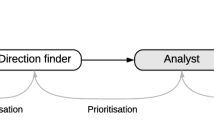Abstract
In a community setting, operational knowledge or “knowledge that works,” refers to knowledge elements that can be put to use. This can be contrasted with encyclopedic knowledge or “knowledge that tells” that sets the background shared mental model among members of a population. Given any community, large amounts of operational knowledge are routinely diffused through social connections. While current day social media catalyzes such diffusion, they are not primarily suited to capture and represent knowledge. This paper argues that operational knowledge aggregation is in some sense, the opposite of encyclopedic knowledge aggregation. The latter is a convergent process that aggregates different local views into a global view; while the former is a divergent process, where common knowledge gets segregated into several local worlds of utilitarian knowledge. If the community as a whole is coherent, these different worlds end up denoting different aspects of the community’s dynamics. Local worlds are not independent of one another and characteristics of one local world affect characteristics of other local worlds. To capture this phenomenon, a data model called Many Worlds on a Frame (MWF) is proposed, that is detailed in this paper.
Access this chapter
Tax calculation will be finalised at checkout
Purchases are for personal use only
Preview
Unable to display preview. Download preview PDF.
Similar content being viewed by others
References
Srinivasa, S.: Many worlds on a frame: Aggregating operational knowledge in community settings. Technical report, Open Systems Laboratory, International Institute of Information Technology - Bangalore (2012)
Bon, G.: The Crowd. Transaction Publishers (1995)
Raafat, R.M., Chater, N., Frith, C.: Herding in humans. Trends in Cognitive Sciences 13(10), 420–428 (2009)
Razoumnikova, M.O.: Functional organization of different brain areas during convergent and divergent thinking: an eeg investigation. Cognitive Brain Research 10(1-2), 11–18 (2000)
Garson, J.: Modal logic. In: Zalta, E.N. (ed.) The Stanford Encyclopedia of Philosophy, Winter 2009 edn. (2009)
Woo, C.: Kripke semantics (version 17), PlanetMath.org , Freely available at http://planetmath.org/KripkeSemantics.html
Author information
Authors and Affiliations
Editor information
Editors and Affiliations
Rights and permissions
Copyright information
© 2012 Springer-Verlag Berlin Heidelberg
About this paper
Cite this paper
Srinivasa, S. (2012). Aggregating Operational Knowledge in Community Settings. In: Meersman, R., et al. On the Move to Meaningful Internet Systems: OTM 2012. OTM 2012. Lecture Notes in Computer Science, vol 7566. Springer, Berlin, Heidelberg. https://doi.org/10.1007/978-3-642-33615-7_23
Download citation
DOI: https://doi.org/10.1007/978-3-642-33615-7_23
Publisher Name: Springer, Berlin, Heidelberg
Print ISBN: 978-3-642-33614-0
Online ISBN: 978-3-642-33615-7
eBook Packages: Computer ScienceComputer Science (R0)




